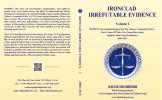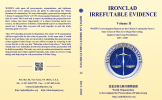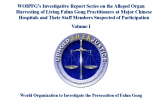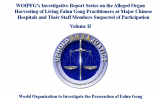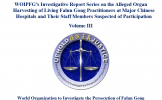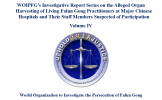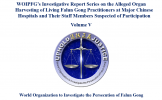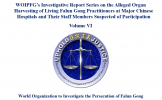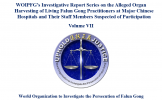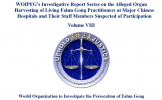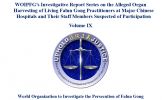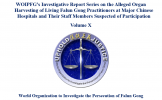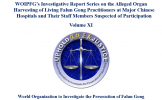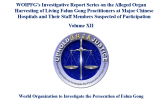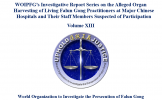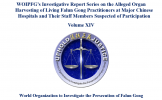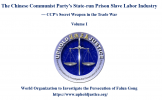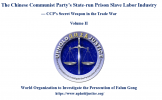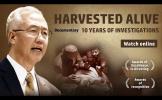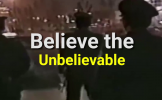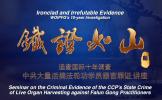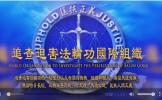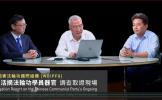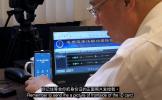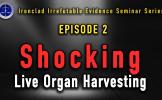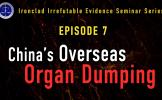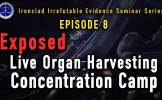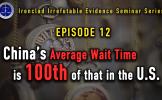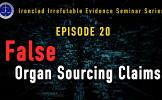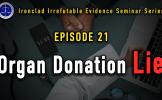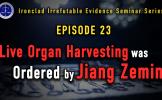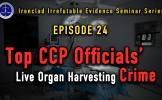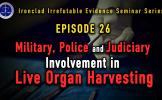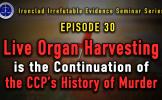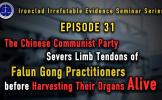How China’s Diplomatic Missions Control and Use Overseas Chinese students
Investigation Report:
Studying Abroad Under the Communist Party—How China’s Diplomatic Missions Control and Use Overseas Chinese students
“It is said that each CSSA chapter is a non-political organization, but each is in fact very much politically oriented, and necessarily so. The Consulate provides funding and resources to each CSSA, which amounts to tremendous assistance, for this resolves all financial worries the student organization might otherwise have. However, our sense is that the Consulate exercises influence in still other, more significant, manners.”
– Blog by Chinese student in Canada [1]
1. Introduction
Chinese Student and Scholar Associations (CSSA) comprise students and scholars from mainland China, who study and work in universities around the world. The groups often portray themselves as independent organizations committed to the welfare of Chinese students and promotion of Chinese culture. There is much evidence to suggest, however, that they are in fact closely controlled and funded by Chinese diplomatic missions. Chinese embassies and consulates use the CSSA to extend the Chinese Communist Party’s (CCP) influence abroad, including for the purposes of manipulating U.S. foreign policy, inciting hate against other students, and violating the rights of people outside China.
Drawing on Chinese media articles, investigative interviews, as well as CSSA documents and websites, this report analyzes the Chinese government’s control of overseas Chinese student associations. Following a brief introduction to the CSSA network, this report will present evidence of how Chinese embassies and consulates exercise this control, including through membership on advisory boards. The report with then consider four case studies illustrating the tasks the missions have assigned in the past to CSSAs to complete on their behalf and in order to promote CCP interests regarding Taiwan, Jiang Zemin’s visit, Falun Gong and New Tang Dynasty TV’s Chinese Classical Dance Competition. The final section will illustrate the way in which the Chinese government uses funding to exercise control over the CSSAs.
2. Background on CSSA network
The CSSA network outside of China is extensive, with associations existing in at least 12 countries as early as the year 2000. In the United States, there are at least 109 such associations, of which 60 are listed by name on China Scholars Abroad, an official website created by the Chinese government. [2] Such lists do not appear to be complete, however, suggesting that the number of associations is in fact much larger. For example, only CSSA-UK is listed under Great Britain on the China Scholars Abroad page [3], but a look at the CSSA-UK site reveals a list of over 70 CSSAs across the United Kingdom [4]. Our research also found organizations in Ireland, Germany, France and Canada.
3. Formal relationship between CSSA and Chinese embassies and consulates
The CSSA’s close relationship with Chinese diplomatic missions abroad is common knowledge among Chinese students and manifests in several ways, ranging from vague references in the association’s bylaws to consular representation on the group’s advisory board.
Our research found that many CSSAs directly state in their constitutions or on their websites that the organization is under the leadership of the local Chinese embassy or consulate. Thus, the CSSA at England's Sunderland University states that “our association is under the leadership and guidance of the Chinese Embassy in the United Kingdom and CSSA-UK.” [5] Similarly, CSSA-France's Art Troupe states in its bylaw that the group is under the guidance and supervision of the Education Section of the Chinese Embassy in France. [6]
In other instances, consular officials not only offer general “guidance” and “supervision” but hold formal positions within the organization, facilitating their intimate involvement in its activities. For example, on the CSSA-Republic of Ireland's website, Tang Jiwei, First Secretary of the Education and Culture Department of the Chinese Embassy in Ireland, is listed as an official contact of the organization. [7] Moreover, the embassy is listed as the CSSA’s primary contact address on its website. [8] In the United States, two of the three CSSA Advisory Board members of Columbia University are officials of the Chinese Consulate General in New York City. They are education consul Fanglin Ai and Da Yao, who is in charge of New York City and Long Island. [9] The CUCSSA webpage also boasts that its constitution was reviewed by the Consulate General of the PRC in New York.[10] In addition to serving as advisor for Columbia University’s CSSA, Da Yao is also listed as an advisor of the CSSA at Cornell University’s Weill Medical College. [11]
An additional avenue of Chinese government control is through CSSA Presidents’ Committees, established since 2000. The committees operate on a regional level, under the direction of the local Chinese consulate. For example, on February 9, 2003, the official CCP mouthpiece Xinhuanet reported that the Chinese Consulate General in Los Angeles had founded the US Southwest CSSA Presidents Committee. The report announced that “the Committee enrolled the CSSA of 18 colleges and universities, as well as national laboratories in Southern California, Arizona, New Mexico, and Hawaii as members, including 12 president’s units.”[12] More recently, on May 26, 2007, the Education Section of the Chinese Consulate General in Houston hosted a meeting for 30 CSSA presidents from Texas and Louisiana. [13] During the meeting the presidents reported on the achievements of their groups, including in “suppressing the moving space of enemy force.”[14]
4. The Nature of the relationship: “Carrying out orders.”
While it is not unusual for diplomatic missions to maintain a relationship with students from their countries studying abroad, in the Chinese case, it is the nature and purpose of the relationship that is disconcerting. As one CSSA in Germany states on its website, the duties its membership is to fulfill include “passing on and discussing how to carry out the orders from the Chinese Embassy and the Ministry of Education of China.” [15] What kinds of orders? As the following case studies indicate, these often involve coordinated action to support and implement CCP policies—including by taking advantage of democratic processes—all the while presenting the image of an independent student organization representing Chinese student views.
a. Writing to Representatives Regarding U.S. Police towards Taiwan
In 2004, Zhang Zhigang, Education Secretary at the PRC Consulate General in Chicago circulated a letter to CSSA chairs in the area informing them of an “important task” assigned by the Consulate General. The task was for them to “call for as many Chinese students and scholars as possible to write e-mails to their respective Congressmen and Senators,” urging them not to support Chen Shui-bian, Taiwan’s president. Zhang then attached sample letters and contact information of the representatives for the students’ reference. Lastly, he set a deadline for the task—that it be completed by March 20 and that a status report be submitted by March 16 (the full text of the letter is attached in Appendix A to this report). [16]
The irony and insidiousness of Zhang’s request is striking. Chinese students who could not elect their own officials or freely express their opinions in China are being ordered by their Communist government to write to democratically-elected officials in the United States and urge them to support CCP policy on Taiwan. At the same time, U.S. officials receiving such requests are likely to believe these are genuine reflections of Chinese students’ opinions, rather than a coordinated effort by the Chinese government to manipulate U.S. foreign policy from the inside.
b. Organizing Teams to Welcome High-Ranking Chinese Communist Leaders
Another common task assigned to CSSA presidents is to organize their members to join groups welcoming CCP leaders during their state visits overseas. Besides waving flags, such “welcome teams” regularly seek to interfere with other demonstrators, often groups protesting against human rights violations in China, such as the suppression of Tibetans and Falun Gong practitioners. The “welcome teams” block the other protestors’ paths, play loud Chinese drums to drown out their calls, and have even tried to rip down their banners.
The connection between the “welcome teams” and the CSSA is evident from the example of former CCP leader Jiang Zemin’s visit to the United States in 2002. On October 16, 2002, the Friendship Association of Chinese Students and Scholars (FACSS) circulated a contract to its member CSSAs, requiring that overseas students who wish to welcome Jiang sign it [17] The contract essentially required the students to waive their right to share the views of the other protest groups, thereby ensuring the appropriate level of “patriotism” among the “welcome teams.” The action was not without its own element of coercion. The contract stated that if anyone caused a disturbance, he or she agreed to pay $5,000. Moreover, the FACSS warned in its e-mail that if anyone violated the contract after signing, he or she would immediately be sued (the full text of the contract is attached in Appendix B). [18]
c. Persecuting and Slandering Falun Gong
Since the CCP started persecuting Falun Gong in 1999, CSSAs abroad have also carried out anti-Falun Gong activities under the direction of Chinese consulates and embassies. This is despite the fact that before 1999, overseas Chinese students practicing Falun Gong had been active CSSA members. Thus, in February 2001, CSSA members in the Houston area attended an anti-Falun Gong forum held at the Chinese Consulate General in Houston. [19] The following month, Zhang Hongzi, Consul General of the PRC in New York, held an anti-Falun Gong forum at Columbia University. Approximately sixty CSSA members from various institutions in the New York area attended the forum. [20] During the meeting, Zhang Kuan, CSSA Chairman of greater New York, and several others initiated a proposal to suppress Falun Gong. [21] Such activities have not been limited to the United States. The constitution of CSSA-Sunderland in England explicitly states that the group would “co-operate with our Chinese embassies and consulates in Great Britain to ... fight against Falun Gong.” [22]
More recently, CSSA groups have been actively interfering in events on university campuses regarding recent reports of organ harvesting from Falun Gong prisoners of conscience in China. One of the most prominent of such incidents occurred at Columbia University, surrounding a forum entitled “China’s New Genocide,” on April 20, 2007. Speaking at the event was David Matas, a Canadian human rights lawyer and co-author of an independent report on organ harvesting from Falun Gong. Prior to the forum, Columbia University’s CSSA (CUCSSA) circulated an e-mail urging Chinese students to stage an on-site protest to disrupt the event, even if this would entail “inevitable physical contact” with campus security. The e-mail stated: “We will use the see of [Chinese Communist] flags, dyed with blood, to strike hard against [Falun Gong’s] arrogant fervor, and to resolutely defend the honor and dignity of the Motherland!” [23]. According to the Epoch Times, during the forum, CUCSSA students “held signs bearing communist slogans and hate speech typically used by state-controlled media in Mainland China” and two students were forced to leave after they had disruptively waved the offensive signs and interrupted forum speakers.[24] After the event, CSSAs from 25 universities in the greater New York area published open letters to support CUCSSA's action.[25] The letters was immediately reprinted by the CCP's mouthpiece Xinhua Net as proof that the crackdown on Falun Gong has received overseas support. [26] Meanwhile, CUCSSA posted nine articles attacking and defaming Falun Gong, all linking to the Chinese embassy’s website. [27] Similar CSSA interference in Falun Gong-related events has also occurred recently at Princeton University and the University of Pittsburgh.
d. Interfering with NTDTV’s Dance Competition
New York-based New Tang Dynasty Television (NTDTV) recently hosted an International Chinese Classical Dance Competition at New York University from July 6 to 8 in 2007 [28]. Because of NTDTV’s independent and outspoken reporting, as well as its long term coverage of human rights violations in China such as the persecution of Falun Gong, the Chinese Communist Party (CCP) was determined to suppress the NTDTV-sponsored cultural event. On April 26, 2007, China Net published a letter from the Chinese Anti-Cult Association to the Chinese Dancer Association, defaming NTDTV and its dance competition. [29] On June 8, the CCP’s mouthpiece Xinhua Net published another slanderous article again entitled the “Story behind NTDTV's Dance Competition.”[30]
Almost immediately, New York University’s Chinese Culture Club (which in Chinese is called the NYU Chinese Student and Scholar Association) began to actively cooperate with the CCP regime in sabotaging the event. On the same day of Xinhua Net 's article, the NYUCCC started a signature campaign to oppose NTDTV's Dance Competition taking place on NYU’s campus. [31] The petition letter was posted on the group’s website in both Chinese and English. Not long afterwards, Columbia University’s CSSA published an open letter on its website citing support for NYUCCC [32] (See also Appendix C for evidence of consular involvement).
5. Chinese embassies and consulates provide operating funds to CSSA
In addition to coercion and pressure to be “patriotic,” funding is another key way in which the Chinese embassies and consulates exercise control over CSSAs overseas. A Chinese Ministry of Education document regarding budgets lists “Propaganda Fund Disbursement,” an item under which the Education Section of overseas embassies and consulates are required to “allocate funds for student’s social activities” each year. [33] Thus, at the beginning of each year, student associations are to submit a detailed budget to their local consulate or embassy followed by an expense report at the end.
That the Chinese government provides funds for CSSAs has been verified by Zhang Pingqiang, former CSSA President at George Brown College and Windsor University in Canada. According to Zhang, the local Chinese consulate provides funds to each CSSA. In some cases, CSSA groups have explicitly cited Chinese government funding. [34] Thus, the finance section of Oxford University’s CSSA bylaw records that: “CSSA funding came from Embassy disbursement, donations, sponsors and ticket sales.” [35] Following are three additional examples of thousands of dollars paid by Chinese overseas missions to CSSA budgets.
Example 1: The 2005 Financial Statement of the University of Tennessee’ CSSA showed that three quarters of its budget came from funds disbursed by the Chinese consulate, while the other 25 percent came from excess funds left over from 2004. [36]
Example 2: In 2006, the Chinese Embassy in Washington DC gave the CSSA at North Carolina State University four separate grants for activities surrounding the Mid-autumn Festival and the PRC’s National Day. The sums were for $1,200, $1,700, $1,173, and $1400, for a total of more than $5,000. [37]
Example 3: Ivy League schools on the U.S. east coast apparently receive special attention from the CCP and have obtained even more funding. One MIT alumnus disclosed that in 2003 the publicized portion of the left over fund of the CSSA at Massachusetts Institute of Technology amounted to more than $25,000. [38]
6. Conclusion
The above evidence points to a disturbing phenomenon of how the Chinese government manipulates overseas student organizations using funding, direct orders and even threats to draw their cooperation. These associations are used for carrying out tasks that advance CCP interests while undermining democracy and human rights outside of China. They deceptively try to manipulate U.S. foreign policy and incite hatred against fellow students who practice Falun Gong, while attempting to quash peaceful dissent against Chinese government policies that have claimed thousands of lives. Such behavior is unacceptable, and possibly illegal, in a democratic society. We urge the U.S. government and American universities to take the necessary steps to end these abuses by the CCP, for they not only victimize Falun Gong practitioners and other dissidents, but both the American and Chinese people as a whole.
References:
[1] “Current situation and development of Chinese Student Association in Canadian Universities”, study in Canada blog (Accessed July 19, 2007) (Back)
[2] “Overseas Foreign Students Scholars Association,” China Scholars Abroadwebsite (Accessed July 19, 2007)
http://www.chisa.edu.cn/. (Back)
[3] Ibid. (Back)
[4] Listing of student associations, Chinese Students Scholars Association @UK website (Accessed July 19, 2007)
http://www.cssauk.org.uk/. (Back)
[5] Experiences of the student association’s work, CSSA-Sunderland, August 17, 2006 (Accessed July 19, 2007)(Back)
[6] “Regulation of All France CSSA's Art Troupe,” All France CSSA website, January 18, 2003 (Accessed Jully 19, 2007) (Back)
[7] Contact information of staff at Chinese embassy in Ireland, includes listing of Tang Jiwei, First Secretary for Education (Accessed Jully 19, 2007) http://ie.chineseembassy.org/. (Back)
[8] Contact form, CSSA@Ireland website, lists Tang Jiwei and Chinese embassy address as addressee (Accessed July 19, 2007) (Back)
[9] Advisory Board members, Columbia University CSSA website (Accessed July 19, 2007) http://www.cucssa.org/. (Back)
[10] “Constituion of the Columbia University Chinese Students and Scholars Association,” January 2007 (Accessed July 19, 2007) http://www.cucssa.org/. (Back)
[11] Medcssa website (Accessed July 19, 2007) (Back)
[12] “Founding of US Southwest CSSA Presidents Committee”, XinhuaNet 2003-02-09 (Back)
[13] Report on China Scholars Abroad regarding that in the afternoon of May 26, 2007, the Education Section of the Chinese Consulate General in Houston held a meeting for CSSA presidents from Texas and Louisiana] http://www.chisa.edu.cn. (Back)
[14] Ibid. (Back)
[15] “Student Association Regulations,” Wurtzburge CSSA, Germany, May 6, 2002 (Accessed July 19, 2007) (Back)
[16] Letter from Zhang Zhigang, on file with WOIPFG. (Back)
[17] FACSS contract regarding welcome teams, on file with WOIPFG. (Back)
[18] Ibid. (Back)
[19] “Chinese Students in Houston Expose and Criticize Falun Gong”, Newsletter of Chinese Students in America, March 26, 2001. (Back)
[20] Geng Wenmo, "Chinese Students and Scholars in New York Area Held Forum to Expose and Criticize Falun Gong”, www.Chinanews.com.cn, March 19, 2001. (Back)
[21] Ibid. (Back)
[22] CSSA Sunderland constitution. (Back)
[23] Stephen Summer, “Facing Communist Hecklers, Speakers Expose Abuse in China, “ The Epoch Times, April 21, 2007 (Accessed July 19, 2007) http://en.epochtimes.com/news/7-4-21/54393.html. (Back)
[24] Evan Mantyk, “Columbia University Forum Reveals Organ Harvesting in China,” The Epoch Times, April 28, 2007 (Accessed July 19, 2007) http://en.epochtimes.com/news/7-4-28/54666.html. (Back)
[25] “A Public Support Letter to CUCSSA from 25 CSSAs around Great NYC,” July 5, 2007 (Accessed July 19, 2007) (Back)
[26] "Chinese Students in US Wrote Open Letter to Protest Against Falun Gong Damaging China's Image", www.Chinaqw.com.cn, May 21, 2007 (Back)
[27.”Lives in NYC,” Columbia University CSSA website, June 17, 2007 (Accessed July 19, 2007) (Back)
[28] NTDTV International Chinese Classical Dance Competition (Accessed July 19, 2007) http://dance.ntdtv.com/web/?q=en/front. (Back)
[29] Letter regarding NTDTV Dance Competition,” April 26, 2007, www.china.com.cn (Back)
[30] "Story Behind NTDTV's Dance Competition", Xinhua Net, June 8, 2007. (Back)
[31] “NYUCCC called to boycott Falun Gong's 'Dance Competition'”, XinhuaNet, June 20, 2007; “Open Letter causing panic within upper echelons of Falun Gong”, XinhuaNet, June 21, 2007. (Back)
[32] “A Support Letter to NYUCCC,” Columbia University CSSA News, June 17, 2007 (Accessed July 19, 2007) (Back)
[33] Ministry of Education, Education-Financial notice [2005] No] 2, “Tentative Measures on Implementing Financial Responsibilities at the Education Section (or Group) of Overseas Embassies and Consulates,” Auditing Department of Sun Yat-Sen University website (Accessed July 19, 2007) http://ce.sysu.edu.cn/sjc/Article/ShowArticle.asp?ArticleID=485. (Back)
[34] Chinese student blog, see note 1. (Back)
[35] Bylaw of CSSA at Oxford University, Oxford CSSA website (Accessed July 19, 2007)(Back)
[36] “2005 Fiscal Year Financial Total,” CSSA University of Tennessee-Knoxville, on file with WOIPFG. (Back)
[37] North Carolina State University CSSFA website (Accessed July 19, 2007) http://www.ncsu.edu/stud_orgs/cssfa/index.html. (Back)
[38] “Open letter of a MIT alumni to overseas Chinese students regarding CSSA”, The Epoch Times (Chinese edition) June 22, 2007 (Accessed July 19, 2007) http://epochtimes.com/gb/7/6/22/n1751002.htm.
Appendix A:
Zhang Zhigang letter regarding U.S. policy on Taiwan
“Dear Chairmans of CSSA:
The Consulate General has assigned you the following important tasks:
We've learned recently that Congressman from Florida Peter Deutsch is trying to persuade all House of Representatives and Senators in US to co-sign a letter, supporting Chen Shui-bian's so-called "defensive referendum", which was to be held on March 20. We request you to use the name of fraternity, to call for as many Chinese students and scholars as possible, to write e-mails to their respective Congressmen and Senators, not to support Chen Shui-bian's wrongful act, as it will hurt Chinese people's feeling. (I have attached sample letters for your reference. You could modify them as needed, but pay attention to your tone in the e-mail; I've also attached the contact information of the addressee.)
You must finish the task by March 20 and you should e-mail me about your status on March 16.(In particular, you should inform me of how many individuals have participated.)
We hope that everyone will show your patriotism and strong wish of Chinese people longing for a peaceful unification of our homeland!
Zhang Zhigang
March 12, 2004”
Appendix B:
Contract for Chinese students joining “Welcome teams” prior to Jiang Zemin visit
The contract was written in English as follows:
“PARTICIPATION AGREEMENT
Group X invites _______________ to be a member in the Welcoming Group. In consideration for this invitation, I agree to abide by the rules and regulations of the Welcoming Group. I also agree if any disturbances are caused by me (e.g. protest against the United States and/or President of China) to pay $5,000.00 as minimal damages for any harm that may result from such disturbances to the group's reputation. Also, in regards to disturbances, I agree that if any another group such as, Fa Lun GUNG, contact us or we become aware of any threats of disturbance by any other groups, I agree to contact the group leaders of the Welcome Group as well as the proper authorities. We understand it is our right to protest with any other groups our views and opinions, but in becoming an active member in the Welcome Group, we voluntarily waive any such rights.”
Appendix C:
Transcript of conversation with Chinese consular representative
The following is the transcript of a conversation between a WOIPFG investigator and Da Yao, consul in the Chinese Consulate-General in New York, covering New York City and Long Island. Da Yao is also one of three Advisory Board members of Columbia University’s CSSA. The conversation took place in June 2007 and illustrates the Chinese consulate’s current control of CSSAs, as well as its direct involvement in NYUCCC’s opposition to NTDTV’s Dance Competition.
Consul: Good morning!
Investigator: Hi, Good morning! Is this the educational exchange affairs?
Consul: This is the Education Group in Chinese consulate.
Investigator: What’s your name?
Consul: My last name is Qiao.
Investigator: Hi, Mr. Qiao…I want to tell you something…It’s about the petition on Dance Competition. Now the pressure on Ke Xiao is really big. Whom should we consult? ...
Consul: OK, you can call this number: 8003.
Investigator: Who should I look for at 8003?
Consul: Look for Consul Da Yao.
Investigator: Oh, Consul Da Yao, 8003, Thanks!
Consul: OK.
……
Investigator: I want to tell you something. Do you know Ke Xiao?
Yao: Ke Xiao?
Investigator: Yes. Now the pressure on him is quite big…. Can the consulate help him?
Yao: Yes. We are doing it now. I think, eh, it’s better to mobilize other universities to disperse this thing. Look at the Columbia University [Translation note: he refers to Columbia University CSSA (CUCSSA)]. They seem to publish a …
Investigator: Which school did you say?
Yao: Columbia University
Investigator: Oh, Columbia University has already started.
Yao: Yes.
Investigator: … That means if not from New York, other states are also fine, right?
Yao: Sure. All are fine.
Investigator: Some students are not …. Is it OK those high school students get involved?
Yao: Don’t use individual name. Use Student Association’s name.
World Organization to Investigate the Persecution of Falun Gong
Tel:1-347-448-5790;Fax:1-347-402-1444;
Mailing Address:P.O. Box 84, New york, NY 10116
Website: http://upholdjustice.org/, http://zhuichaguoji.org/en


